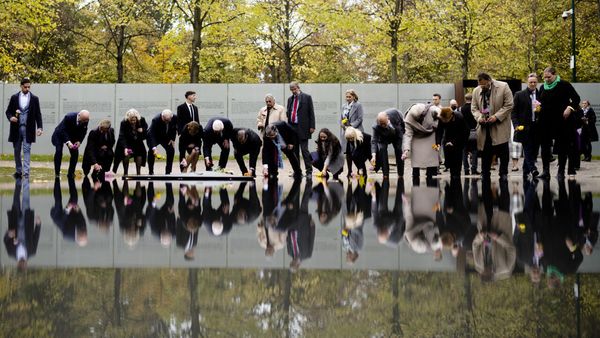
An emergency meeting of the heads of EU member states has been called on Tuesday in an effort to “harmonise” the bloc’s response to the conflict in Israel and Gaza after a week of dysfunction and division.
As fears grow over the risk of a wider war and a humanitarian catastrophe in the region, EU member states admit they have struggled to put on a united front as they did in February 2023 when Russia invaded Ukraine.
The European Council president, Charles Michel, issued a joint statement on Sunday after a weekend of frantic calls to all 27 member states, but after a week of rows over funding for Palestine and Ursula von der Leyen’s visit to Israel, insiders say the lack of coordination in the past week cannot continue.
There are concerns that the conflict in Israel and Gaza will weaken the coalition of support that the EU had built in the global south involving countries in Africa, the Middle East and Asia. It could also impede efforts to advance the Ukrainian peace process.
With the stakes so high, member states are increasing their efforts to keep foreign policy coordinated and on track and will meet by video on Tuesday to progress plans for humanitarian support and other issues.
Insiders say there would have been no emergency summit were it not for a series of missteps in the last week in Brussels.
There have been criticism of the European Commission president Von der Leyen’s forthright statements on Israel. She repeatedly defended the country’s right to defend itself in the fact of a terrorist attack but it was days before she also called on Israel to respect international law in its defence.
Such an omission caused anger in some countries, while others complained in phone calls to Michel’s team about overreach and the commission’s failure to consult it on such an important foreign policy topic as Israel.
The complaint had echoes of divisions that erupted last month when the high representative for foreign policy, Josep Borrell, complained that member states were not consulted regarding the migration pact that Von der Leyen, Italy’s Giorgia Meloni and the Netherlands’ Mark Rutte sealed with Tunisia.
A lack of coordination in a time of crisis can be forgiven but in the last week tensions have spilled out into the open. Michel took umbrage that not only had he, the member states’ representative in Brussels, not been invited to join Von der Leyen in Israel over the weekend but he had not been consulted about the trip either.
“The first he knew about it was when calls starting coming in from the press,” said an insider. They pointed out that it is the European Council, not the commission, that has the legal mandate to create foreign policy.
Von der Leyen’s supporters said Borrell, who takes his instructions from the member states but sits in the commission, was “strongly encouraged” to visit Israel but he was otherwise engaged on a trip to China.
They also said nobody complained about overreach into foreign policy when she visited Ukraine after Russia’s invasion or when she pushed for sanctions.
“I think you have to be fair to her. She pushed the envelope on sanctions and people were saying it was great they had someone in charge, a leader,” said one.
It is understood that the EU, which has just announced a tripling of humanitarian funds for the Middle East, stands ready to quickly move with support on potential refugee camps in Egypt.
There is a recognition in Von der Leyen’s office that errors have been made in the past week, including a rogue post by the Hungarian commissioner for enlargement and neighbourhood, Olivér Várhelyi, who announced that “all payments” were being cancelled to Palestine.
He did not consult Von der Leyen or fellow commissioners, a move considered a mistake by senior colleagues.
The commission and member states are extremely concerned about the fate of EU citizens who have been taken hostage by Hamas and the estimated 1,000 EU civilians in Gaza, many of whom work for NGOs. And there are worries about antisemitism and hate crimes increasing in home territories.
Ukraine, too, is a huge concern. While the US and the EU’s support for the country has not faltered, a wider war in the Middle East will cause competition not just for military support but for political attention, say insiders.







